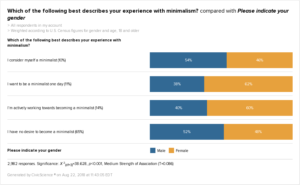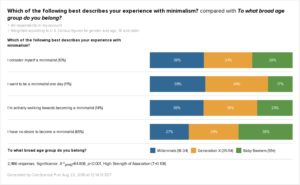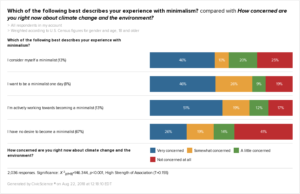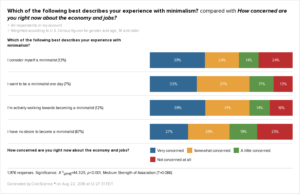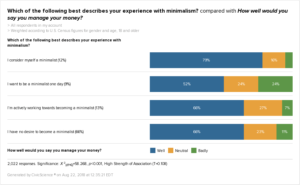Minimalism has certainly gained popularity over the last few years – from minimalist home designs to a minimalism podcast, to a best-selling how-to book for minimalism. But, Americans as a whole aren’t minimalists.
CivicScience polled over 2,900 U.S. adults around the role minimalism plays in their lives.
The vast majority of American adults, 65%, say they have no desire to follow a minimalist lifestyle. Only 10% say they already consider themselves as minimalists. Meaning that 1 in 4 U.S. adults either want to become a minimalist one day or are actively working towards it now.
10% of U.S. adults say that they already follow a minimalist lifestyle. This low number might come as a bit of a surprise considering that almost half, 46%, of U.S. adults also say they have “an incredible” amount of things that they could get rid of.
Who’s more likely to be following this minimalism trend now and who might be joining in in the future?
CivicScience found a number of correlations when it comes to being, or wanting to be, a self-described minimalist.
Women want to be minimalists
Women are far more likely than men to want to become minimalists one day (58%) and to already be working towards a minimalist lifestyle (59%).
Men, on the other hand, are pretty split. 52% of U.S. Adults who don’t want to become minimalists are men. But, men are also more likely to already consider themselves as minimalists.
While minimalism may not be very popular now, the idea seems to be resonating with women, who already control household purchasing power in food, retail, children’s products, and household items. In this regard, it’s definitely a potential trend to keep an eye on.
Millennials are leading minimalism
Of those who already consider themselves minimalists, most are Millennials (38%). Millennials are also the least likely to say they have no desire to become minimalists (27%). Baby Boomers are the most likely (38%). Gen Xers are the most likely to say they want to be a minimalist “one day” (44%), followed closely by Millennials (39%).
Minimalism might also be about environmental concerns
Minimalists and aspiring minimalists alike all share a common sentiment–they’re most likely to be “very concerned” about the environment. 46% of people who say they’re minimalists are very concerned about the environment. 46% of people who one day want to become minimalists and 51% of those actively working towards minimalism are very concerned about climate change and the environment.
On the other hand, 41% of people who have no desire to have a minimalist lifestyle are not concerned at all about the environment. These numbers lead us to believe that for some, an environmental concern may be a factor in deciding to live with less.
Money, the Economy, and Minimalism
Those who already are minimalists and who are actively working to become minimalists are also most likely to be concerned about the economy and jobs at 38% and 39%, respectively. Minimalists also report that they’re good at managing their money:
79% of minimalists say they manage their money well. Some financial sources suggest that adopting just a few minimalist lifestyle habits can save money. Concerns about the state of jobs and the economy may be leading some Americans to follow tighter budgets and therefore influencing them to embrace the idea of minimalism.
Time will tell if minimalism is a fad or a growing trend. For now, we know that financial, economic, and environmental concerns might entice some Americans, specifically Millennials and women, to live with less.


